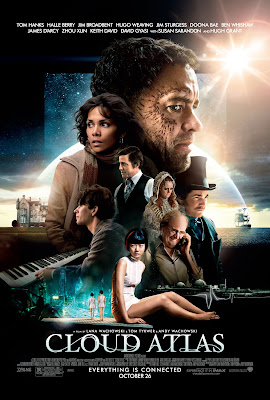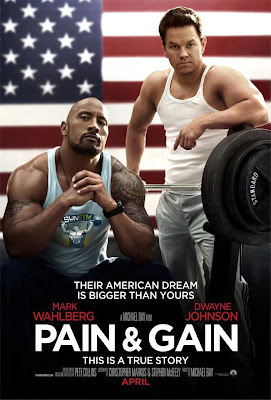‘Cloud Atlas’ Presents A Sextet Like No Other
Cloud
Atlas:
4 out of 5
Robert Frobisher: I believe there is a another world waiting for us, Sixsmith. A better world and I'll be waiting for you there.
For all
the sequels and blockbuster we have gotten this year, an ambitious,
high-budgeted, semi-independent film has certainly tried to push itself to the
top as well. Cloud Atlas is one of the more unique films I have
seen this year, as it not only swaps between six different storylines, but six
different time periods, which range from the 1840s to way into the
future. Add to that a handful of actors, all playing a variety of
different roles and you can see why it is a very intriguing project, developed
and directed by three talented filmmakers. Some flaws aside, I found Cloud
Atlas to be incredibly well structured, given the complex nature of the
story being told, and a wonderful work of art, after discounting the
awkwardness of putting familiar actors in odd makeup. It will surely be
divisive, but I was really into what co-directors Andy & Lana Wachowski and
Tom Tykwer challenged themselves to make.
Without
going into overkill with plot summary, I can say that Cloud Atlas spans
time to tell an epic sort of story about humankind. Several characters are involved in each of the
six stories being told, played by many of the same actors, with a possible
implied connection. With the times being presented, 1849 shows us the
story of an American’s (Jim Sturgess) journey home, traveling by ship over the
Pacific Ocean. 1936 presents the story of a poor English musician (Ben
Whinshaw), composing a masterwork in Belgium. 1973 has a young journalist
(Halle Berry) trying to uncover the truth behind a nuclear power plant in
Northern California. 2012 finds an elderly man (Jim Broadbent) on the run
from gangsters and wrongfully confined in a nursing home. A near
dystopian future, set in Neo Seoul, tells the story of a clone (Doona
Bae)
escaping her captivity and working to incite a rebellion. Lastly, in a
distant, post-apocalyptic Hawaii, one man (Tom Hanks) teams up with one of the
last members of a technologically advanced group of people in an effort to save
what is left of humanity. There are lots of connections between each
story and there will be many revelations seen during each story’s unfolding.
Cloud
Atlas was
originally written as a novel by David Mitchell in 2004. The film was
co-written, co-produced, and co-directed by Lana & Andy Wachowski and Tom
Tykwer. It should also be worth pointing out that the funding for the
film was made up of a number of independent sources, while Warner Brothers only
covered some of the budget for this film. I mention this, because while
the film does have some missteps in the way it treats itself quite seriously in
some instances (despite some purposeful humor), lacking any sort of
self-awareness in favor of self-importance, the fact is that these filmmakers
really care about this story and did the best with what they had to make it an
engaging experience. As opposed to being a throwaway piece of
experimental filmmaking, it seems clear that the effort was put forward to make
a compelling and unique experience.
Cloud
Atlas lasts
nearly three hours and while it does not necessarily fly by, I do have a lot of
respect for how great I thought the editing of the film by Alexander Berner
was. A complex plot structure like this, with six different stories, six
different time periods, and an assortment of different characters could have
easily been a huge mess, but I did not find that to be the case at all. I
was right along with the film, as it presented a collection of visuals, themes,
and ideas. I would not say that I was completely in tuned to everything
that was laid out in this film, but the fact that I am considering multiple
viewings as a positive makes me believe Cloud Atlas to have been a
worthwhile experience.
Isaac Sachs: Yesterday my life was headed in one direction. Today it is headed in another.
I guess it
may be necessary to define what I consider to be narrative cohesiveness in the
case of Cloud Atlas. While I do
take issue with certain things that happen in some of the stories and some of
the characters involved, let alone have sections I preferred over others, I did
not have trouble following along with the flow of the film, regardless of how
it intertwined each story. There was no real pattern to it, aside from
ending one scene with a convenient transition to another, based on the imagery
or what we are hearing, via the narration. I am placing emphasis on all
of this because I think being able to get through the story is the most
important aspect of the film. Were it not for the way structure plays its
part in this film, I feel like many would walk away asking themselves what they
just watched, based on how much this film is throwing at you and the fact that
you have something like six flavors of Tom Hanks to deal with, most of which
feel like the weirdest Tom Hanks you have ever seen.
Getting to
the actors in this film, along with the ones previously noted, the film also
features Hugo Weaving, Hugh Grant, Keith David, James D’Arcy, and Susan
Surandon all playing a variety of different roles. It would, again, be
too much to explain who these people play, let alone delve into each of them
appropriately, without giving away spoilers, but suffice it to say that despite
the issue I found with dressing up and using makeup effects to make these
people look completely different, depending on the time period (particularly in
the Neo Seoul section), there are a lot of very good performances here.
Given that they are top-billed, I will say that Hanks and Berry are quite good
in the majority of their roles. Hugh Grant also impressively plays
against type, as he is essentially in villain mode in all of his roles.
The best work probably comes from
Doona Bae, which probably also has to do with her section (what I would refer to as the start of the Clone Wars), being among the best (despite makeup issues).
Doona Bae, which probably also has to do with her section (what I would refer to as the start of the Clone Wars), being among the best (despite makeup issues).
Based on
what I know about the book, I think the structure of the film is a little
different, but still effective in what it is after. Each director handled
different sections of the film, with their styles being apparent in each.
They all have managed to insert great moments in each segment, though I did
have the least reaction to the 1849 section of the film and found the present
day section to be a little off-putting, as it relied on a lot of comedy, while
the rest of the film was striking a different kind of tone. Still, while
a sextet is important in representing the point of this film, some of the
segments were easily strong enough to be their own self-contained narrative.
Javier: What are you reading?
Luisa Rey: Old letters.
Javier: Why do you keep reading them?
Luisa Rey: I don't know. Just trying to understand why we keep making the same mistakes... over and over.
Now, were
one not to have seen this film yet, there is still a reasonable understanding
to not quite be sure what one is getting into. While Cloud Atlas
is not necessarily a difficult film to comprehend, it is a weird one to try to
sell to people unfamiliar. This leads me to what I understood and
appreciated about the film and what I also found fault with. On the
positive side, Cloud Atlas manages to be clear on a number of themes it
is going after in each section. Namely, slavery and injustice are bad
things that need to be abolished (no kidding) and to do so, people need to rise
up and attack the system, which has become morally corrupt. Some segments
handle this better than others, but the through line becomes quite clear, and
when the movie is truly working, it really delivers on being an affecting piece
of cinema. Where I found issue was with a number of the characters and
how they are interconnected, based on the same actor representing different
people. Without delving into spoilers, I will simply say that if some of
these characters were supposed to be connected, which is what I think the film
was going for in some instances, it did not make too much sense to me as to
why.
With all
of this said, I have hardly touched upon the impressive nature of this film on
a technical level. Looking past the makeup, which does have a lot of
merits, when I wasn’t being distracted by some of the characters, there is
plenty to admire. There are six worlds created in this film, which all
look great and are unique to themselves. The visual effects used to
create dystopian and post-apocalyptic worlds work well here, complete with some
disturbing imagery to evoke a number of other similar films. I also think
Tykwer’s European filmmaking sensibilities have afforded him the chance to
portray certain scenes differently than how one generally sees, for example, a
film set in 1973 from an American filmmaker perspective. The
cinematography by Frank Griebe and John Toll does wonders in making this a
great looking film and the score, composed by Reinhold Heil, Johnny Klimek, and
Tykwer works well to amplify the effect of the film accordingly.
The
benefit of a film like Cloud Atlas is that I think it is the kind of
film that will provoke a lot of discussion, regardless of whether people like
it or not. There is so much going on in it and it has so much to offer,
that it succeeds on being at least a debatable watercooler topic. In
writing about the film and thinking about it more, I would be happy to see it
again at this point, as I would maybe be able to focus less on certain awkward
aspects and more on how these characters are all interconnected. Based on
what I have already written though, I do think I have made it clear that I
really did embrace Cloud Atlas as an ambitious, unique, and compelling
film to watch. It is not flawless, but regardless of how big the scale,
there were a lot of people involved in a film that feels like a very personal
project to have been a part of.
Louisa Ray: Is this the Cloud Atlas Sextet?
Record Store Owner: I doubt there’s a handful of copies in all of North America.
Louisa Ray: But I know it. I know I know it.
Aaron
is a writer/reviewer for WhySoBlu.com.
Follow him on Twitter @AaronsPS3.
He also co-hosts a podcast, Out Now with Aaron and Abe, available via iTunes or at HHWLOD.com.
He also co-hosts a podcast, Out Now with Aaron and Abe, available via iTunes or at HHWLOD.com.












The reviews I've read for Cloud Atlas have been all over the map. The trailer looked really bizarre, and I've heard a lot about the plot changing a lot, as if plagued by really severe ADHD. I guess at almost three hours, I'm not sure that's my cup of tea.
ReplyDeleteThusly, sending blessings online makes our reality substantially more pleasurable and this is apparent by the notoriety of the online stores that have risen over the recent decades since the coming of the Internet. https://www.teddyway.de/riesen-elefanten-kuscheltiere/
ReplyDelete